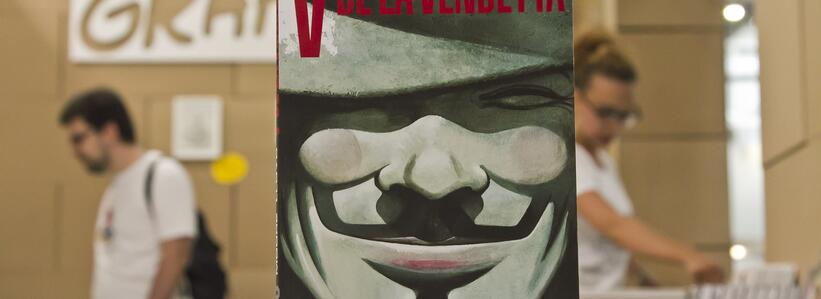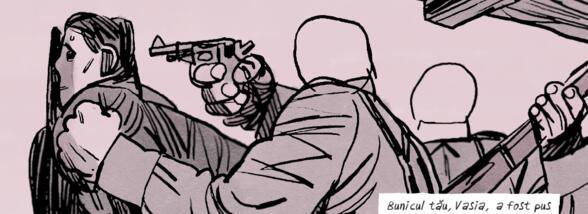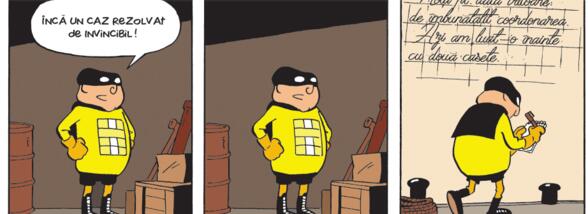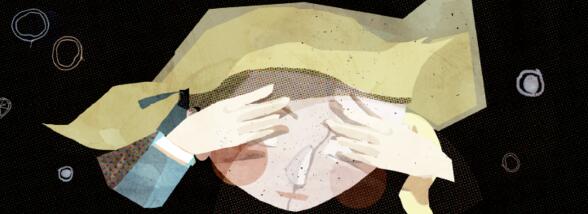10 întrebări pentru David Lloyd. Prima parte
În luna mai, editura Grafic a organizat pe pagina de Facebook concursul 10 întrebări pentru David Lloyd, iar co-autorul cărții V de la Vendetta a primit din partea voastră peste 30 de întrebări dintre care a ales doar 10 cărora le-a oferit răspunsuri în scris. Astăzi vă prezentăm cinci dintre ele. Lectură plăcută!
Mădălina Ceaușescu: Când v-ați dat seama că sunteți cu adevărat bun la ceea ce faceți?
David Lloyd: E greu de spus dacă e să te referi la toate elementele care te fac un bun ilustrator de bandă desenată. Mi-am dat seama că sunt bun la câteva dintre lucrurile astea de pe la 13 ani, când am desenat prima mea poveste de bandă desenată doar de dragul distracției - o adaptare a unei povestiri de Arthur C. Clarke, cu titlul Security Check. Calitatea ilustrațiilor nu era nemaipomenită, dar stăpâneam atmosfera, lumina, compoziția cadrelor și firul poveștii. Știam asta pentru că o vedeam cu ochii mei, ca pe o poveste de la TV sau de la cinema. Mi-am dat seama instinctiv că se susținea ca material pentru TV sau cinema - cu care banda desenată este în relație directă - pentru că, începând de la șase-șapte ani, mă uitasem ore în șir la TV și văzusem o mulțime de filme la cinema. Aveam însă nevoie să-mi dezvolt abilitatea de bază de a desena pentru a fi sigur că o stăpânesc cu adevărat. Iar pentru asta am avut de străbătut un drum lung, până pe la 20 și ceva de ani. La un moment dat, în timpul acelei perioade aș fi putut spune că sunt cu adevărat bun la ceea ce fac, dar aveam nevoie de confirmarea oferită de publicarea profesionistă regulată pentru a fi cu adevărat sigur de asta.

Răzvan Nistor: Cât de asemănătoare e situația politică actuală cu cea din V de la Vendetta? Putem compara situația actuală cu cea din V de la Vendetta?
David Lloyd: Acțiunea din Vendetta are loc într-o țară care și-a pierdut sistemul democratic. Menținerea acestui sistem este cea care împiedică majoritatea societăților complexe să se transforme în societatea din V. Dar noi ne-am imaginat societatea din V într-o lume în care Marea Britanie era izolată, și nu parte a unei structuri de putere grupată la nivel global, așa cum sunt în prezent cele mai multe societăți. Cel mai periculos inamic este sistemul de control global preluat de structuri nealese în mod democratic - o amenințare potențială a societății oricărei țări - pentru că influența acestor structuri în toate sectoarele guvernamentale ale unei țări le poate transforma în dictatori care hotărăsc direcția respectivei țări, indiferent de dorințele cetățenilor respectivei țări. Fără o asemenea influență dominatoare, o țară democratică poate evita să cadă în plasa farmecelor unui politician abil precum Hitler sau Comandantul din Vendetta. Dar dacă o asemenea influență există, va exista și pericolul instaurării unui regim autoritar în societate.

Adi Crețu: Ați fi vrut să modificați anumite părți din scenariul lui Alan Moore pentru V de la Vendetta?
David Lloyd: Chiar am modificat într-o oarecare măsură scenariul lui Alan. Și am influențat direcția în care se îndrepta. Am discutat fiecare pas al evoluției lui V. Și, la început, nu aveam idee despre cum va progresa sau cum se va sfârși. Totul s-a dezvoltat pe parcurs. La începutul creării lui V, Alan a realizat o descriere fabuloasă a lumii lui V, dar nu a scris întreaga poveste. Povestea a fost creată pas cu pas, capitol cu capitol. Un capitol a fost modificat complet pentru că mi s-a părut că nu se potrivește, au fost modificate sau adaptate scene întregi, s-a modificat felul în care arătau personajele, iar întreaga poveste a fost influențată de o întâmplare, când am introdus un personaj a cărui apariție nu fusese plănuită în prealabil. Nu am scris niciun cuvânt în V, dar nu e nimic în V care să nu fie rezultatul unui efort de colaborare a două creiere care încercau să spună cea mai bună poveste posibilă în cel mai bun mod posibil.

Naghi Armin: De unde a venit ideea Angliei aflată sub controlul unui regim totalitar fascist, v-ați gândit la un stat nazist sau comunist când ați conceput povestea?
David Lloyd: Ideea de a spune ceva despre ascensiunea dreptei radicale ne-a venit pentru că, spre sfârșitul anilor ’70, și eu și Alan eram îngrijorați din cauza a ceea ce se întâmpla și deja scriseserăm amândoi, separat, povestiri despre un posibil viitor al Marii Britanii conduse de un regim autoritar. Printre operele de ficțiune care ne-au influențat s-au numărat: 1984, Fahrenheit 451, Minunata lume nouă, serialul TV The Prisoner, precum și un alt serial TV britanic grozav, The Guardians, despre o lovitură de stat militară, cândva în viitorul Angliei. Nu ne-a trecut prin minte să ne referim la o dictatură de extremă stângă în loc de extrema dreaptă pentru că de-a lungul timpului istoria socială a Marii Britanii a arătat tendințe de dreapta, dar, la o analiză finală, toate guvernările totalitare seamănă între ele.
Modelul de bază pentru societate din V a fost acela al Germaniei din anii ’30. Societatea aceea a apărut ca urmare a șomajului masiv și a hiper-inflației și aștepta un salvator care să o scoată din prăpastie. Oamenii erau disperați, astfel că puteau fi exploatați cu ușurință, fiind dispuși totodată la corupție morală. Iar Hitler îi aștepta…

Aron Szele: Care a fost relația cu autorul? S-a întâmplat să aveți opinii diferite privind transpunerea grafică a a unei anumite scene?
David Lloyd: M-am înțeles foarte bine cu Alan. Eram prieteni și aveam multe lucruri în comun, amândoi ne formaserăm în fanzine, unde fuseserăm publicați pentru prima dată; amândoi fuseserăm influențați de aproximativ aceleași cărți, emisiuni TV și filme, aveam opinii politice asemănătoare pe care ne doream să le exprimăm în creațiile noastre și eram amândoi nou-veniți în industria benzilor desenate - eu de 3 ani, iar Alan numai de 2 ani. Eu am fost prima persoană cu care a avut o colaborare de lungă durată, și poate că lucrurile n-ar fi mers atât de lesne dacă n-am fi fost amândoi pe aceeași lungime de undă datorită lucrurilor pe care le aveam în comun.
Și, ca să răspund la o întrebare pe care o primesc adesea în ceea ce privește colaborarea cu Alan, la vremea când lucram la V, Alan nu scria scenariile astea lungi și încâlcite pe care aud că le scrie acum pentru mulți dintre cei cu care lucrează. A început într-adevăr să scrie excesiv de mult la o scenă din V, dar l-am oprit și am glumit amândoi despre asta. Am niște păreri foarte ferme în privința împărțirii îndatoririlor creative între scriitor și ilustrator și n-aș lucra niciodată cu un scriitor care mi-ar da prea multe indicații, ca un interpret al nevoilor scenariului.
Și, în ultimul rând, nu a existat niciodată vreo divergență între noi în privința felului cum s-a transpus grafic vreo scenă, pentru că toate ilustrațiile erau la latitudinea mea. N-am primit nicio indicație de la Alan despre cum să fie desenate cadrele, ci doar despre ce să conțină.

Traducere din limba engleză de Iulia Pomagă
Mădălina Ceaușescu: When did you figure out that you were good at what you were doing?
David Lloyd: That's difficult to say if you're talking about all the elements that make good strip art. I knew I was good at some of them from the age of 13, when I drew my very first real comic strip story for fun, which was an adaptation of a story by Arthur C. Clarke called Security Check. The art wasn't terrific, but I'd got the atmosphere, the lighting, the panel composition, and the storytelling right. I knew that because I could see it through my eyes as if it was a TV or cinema story. I instinctively knew it worked as TV or cinema - which comic art is directly allied to - because I had seen hours and hours of TV and movies from the age of six or seven. The basic drawing skills were the thing that I'd need lots more time to develop and be sure I was good at. And that was a very long road that took me into my mid 20's. At some point in those years I could have said that I was really good at what I do, but I needed the confirmation of being regularly published professionally to be certain of that.
Răzvan Nistor: How close is the current state of affairs to the political situation in V for Vendetta? In which way does our current situation compare with the one in V for Vendetta?
David Lloyd: Vendetta takes place in a country that's lost its democratic political system. Keeping that system alive keeps most sophisticated societies from becoming like the society of V. But the society in V was imagined by us in a world where the UK was isolated, and not part of a globally-linked group of power structures as most developed societies are now. It's that global web of control from un-elected power structures that's the big enemy now - and a potential bully of any country's society - because their influence in all areas of any country's government can make them the dictators of that country's direction, whatever the citizens of that country might wish otherwise. Without such overbearing influence, a democratic country can avoid falling for the charms of a smart political operator like Hitler, or the Leader in Vendetta, if it wants to. But with it, the danger always exists that authoritarian rule may be introduced to a society whether they've allowed it happen or not.
Adi Crețu: Would you have liked to change some parts of Alan Moore’s script for V for Vendetta?
David Lloyd: I did change some of Alan's script. And steered it's direction. We talked over every step of the way on V. And, in the beginning, we had no idea how it would progress and finish. It was being made up as we went along. At the beginning of the creation of V Alan wrote a fabulous outline of the world of V, but not the whole story. It was created ' book' by book, and chapter by chapter. One chapter was completely changed because I thought it didn't work; scenes were changed or added; the look of characters was changed; and the whole story moved on by an accident when I introduced a character who had not been previously envisioned as appearing. I didn't write a single word of V - but there is nothing in V that was not a collaborative effort of two brains trying to tell the best story they could in the best way they knew how.
Naghi Armin: Where did the idea of England under a totalitarian fascist regime come from, did you think about making it a Nazi state or a communist one when you were conceiving the series?
David Lloyd: The idea of wanting to say something about the rise of the radical right wing came about because, in the late 70's, both myself and Alan were concerned about that happening, and had each separately written stories about a future Britain ruled by an authoritarian government. Our influences from fiction were, among others, 1984, Fahrenheit 451, Brave New World, The Prisoner TV series - and another great British TV series called The Guardians, about a military coup in a future England. It didn't cross our minds to make it a left-wing dictatorship rather than a right-wing one, because British social history showed more signs of a tendency to the right - but, in the final analysis, one totalitarian government is very much like another.
Our basic model of the society in V was fashioned from that of Germany in the 30's. That society had come out of massive unemployment and hyper-inflation and were looking for a savior to pull them out of the hole. They were desperate; thus ripe for exploitation, and open to moral corruption. And Hitler was waiting for them...
Aron Szele: How did you get along with the author? Did you ever have different opinions about how to graphically transpose a certain scene from the script?
David Lloyd: I got on very well with Alan. We were friends with much in common; we'd both cut our teeth on fanzines, where we we'd been published for the first time; we'd been brought up on - and been influenced by - many of the same books, TV shows and movies; we had similar political viewpoints that we wanted to express in our work; and we were both fresh in the industry - I'd been in it for 3 years, Alan, for just two. I was the first person he'd collaborated with on an ongoing basis, and it might have not been the smooth ride it was if we had not been on the same wavelength, which came from the things we had in common.
And to answer a question I'm asked often about in working with Alan: at the time we did V, Alan was not writing the intricate and lengthy scripts which I hear he's been writing for many of the other people he's worked with. At one stage during V, he did begin to overwrite, but I stopped him, and we joked about it. I have firm views about the split of creative duties between the writer and the illustrator, and I would never work with a writer who was giving me too much instruction as an interpreter of any script's needs.
And, finally, there was never any differences arising from how a scene was graphically rendered, because all the art was up to me. I had no direction from Alan on how panels would be drawn, only on what was in them.
V de la Vendetta de Alan Moore
Ilustrații de David Lloyd
Traducere din limba engleză de Iulia Pomagă
Grafic, 2018





